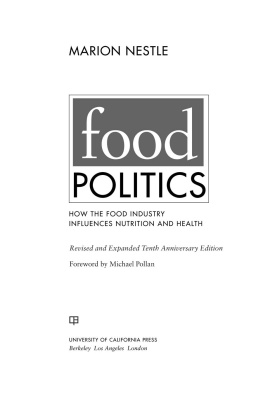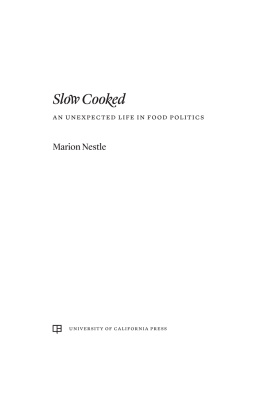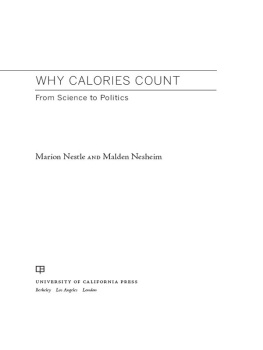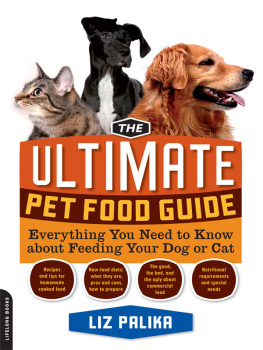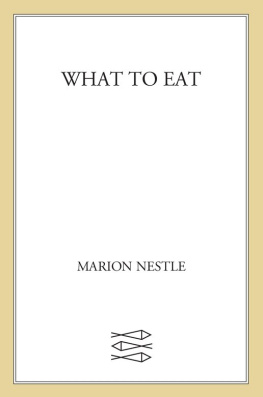PET FOOD POLITICS
MARION NESTLE
PET FOOD POLITICS
The Chihuahua in the Coal Mine

University of California Press, one of the most distinguished university presses in the United States, enriches lives around the world by advancing scholarship in the humanities, social sciences, and natural sciences. Its activities are supported by the UC Press Foundation and by philanthropic contributions from individuals and institutions. For more information, visit www.ucpress.edu .
University of California Press
Berkeley and Los Angeles, California
University of California Press, Ltd.
London, England
2008 by Marion Nestle
The cartoon on p. 167 appeared in the New Orleans Times-Picayune, March 23, 2007. Steve Kelley Editorial Cartoon 2007 Steve Kelley. All rights reserved. Used with permission of Steve Kelley and Creators Syndicate.
Library of Congress Cataloging-in-Publication Data
Nestle, Marion.
Pet food politics : the Chihuahua in the coal mine / Marion Nestle.
p. cm.
Includes bibliographical references and index.
ISBN 978-0-520-25781-8 (cloth : alk. paper)
1. PetsFeeding and feedsContaminationUnited States. 2. Product
recallUnited States. I. Title.
SF414.N47 2008
363.19'29dc22
2008003995
Manufactured in the United States of America
17 16 15 14 13 12 11 10 09 08
10 9 8 7 6 5 4 3 2 1
The paper used in this publication meets the minimum requirements of
ANSI/NISO Z39.481992 (R 1997) (Permanence of Paper).
To Malden Nesheim
CONTENTS
INTRODUCTION
On March 15, 2007, Menu Foods, a pet food manufacturer based in Canada, informed the U.S. Food and Drug Administration (FDA) that the company had decided to issue a massive recall of its products. Something in its foodslater identified as wheat flour laced with melaminewas causing so much damage to the kidneys of cats and dogs that the animals had to be euthanized. The companys decision, announced the next day, led to what was then the largest recall of consumer products ever recorded in the United States.
I had a special interest in this particular food recall. Just one month earlier, I had obtained a contract to co-write a book about pet foods and pet feeding with Dr. Malden Nesheim, the now retired chair of the Department of Nutritional Sciences and provost at Cornell University. Both of us have had long academic careers in human nutrition and our colleagues were surprised by our interest in writing about something as seemingly inconsequential (in their view, not ours) as pet foods. The Menu Foods recall established our project as brilliantly insightful. Even our most skeptical colleagues could see that pet foods were the proverbial canaryin this instance, the Chihuahuain the coal mine. Contaminated pet foods were early warnings of the safety hazards of globalization.
The pet food recall may have begun with the personalthe tragic loss of beloved cats and dogsbut it quickly transformed into the political. The events that followed in the wake of the recall exposed catastrophic weaknesses in global safety systems not only of food production and distribution but also of consumer products as diverse as toothpaste, tires, and childrens toys. Contaminated pet foods revealed the need for immediate effortsby governments and industriesto correct some of the less desirable consequences of our rapidly globalizing world economy.
By the time the events of the recall drew to a close, it had become apparent that pet foods are just one part of an inextricably linked system of food production, distribution, and consumption, a system that involves farm animalspigs, chickens, and fishas well as people. Because the tainted ingredient had been imported from China by a company located in Canada, was used to make pet foods in factories in the United States, and was shipped to venues in South Africa as well as in the United States and Canada, what started out as merely a problem for a few cats and dogs ended up as an international crisis. Consumers lost confidence in the safety of American food products as well as in those imported from other countries, and for good reason. The pet food recall exposed glaring gaps in the oversight of food safety not only within the United States and at its borders but also within rapidly developing countries like China that produce foods for export.
Overall, the recall revealed that anyone interested in the health of people, food animals, or pets should care deeply about how pet foods are made, used, and regulated. Pet foods, as Dr. Nesheim and I had already surmised, are well worth the attention of anyone, pet lover or not, who cares about matters as seemingly distinct as food safety, health policy, international trade, and the relationship of corporations to government. The pet food recall demonstrated the tight linkages among all such matters.
This book tells the story of one particular failure in food safety systems, from its disclosure in March 2007 to the events that occurred throughout the year that followed. And what a story it is. Although pet foods were not the only foods to be recalled in recent yearscontaminated spinach, hamburger, and peanut butter leap to mindmost humans do not feel strong emotional attachments to such foods. Pets are another matter entirely. Pet owners (or guardians, as many prefer) are fully responsible for what their pets eat and are likely to be distressed, if not infuriated, when the foods they have purchased cause their dogs and cats to suffer. In part because of the deep bonds of affection between humans and their pets, the story of the Menu Foods recall becomes one of high drama, worthy of Shakespeare, full as it is of selfishness, greed, cowardice, indifference, irresponsibility, secrecy, and deception, as well as frustration, anger, and grief.
By the time this story came to an end, the governments of China and the United States were promising much neededand long awaitedreforms of their food safety systems and much better guarantees of oversight of international trade. If the governments really do deliver on their promises, some good may yet emerge from these events. If so, the owner-guardians of pets inadvertently caught up in this crisis may gain some solace from knowing that the sacrifice of their animals was not in vain.
This is a comforting thought. But from the outset the promised reforms have fallen far short of the measures that experts have long advocated to ensure safe food for people, let alone for dogs and cats. We can only hope that the reforms will do some good. To make sure they do, everyone who cares about food issues must continue to advocate for better safety policies for the human food supplyincluding regulations, inspections, and enforcementas well as for better nutrition standards and more informative food labels for pet foods. Advocacy for policies good enough to protect pets also means advocacy for policies that protect people.
As the author of two previous books about the politics of food, I cannot overemphasize the need for advocacy. In Food Politics: How the Food Industry Influences Nutrition and Health (published by University of California Press in 2002 and updated in 2007), I wrote about how food companiesbusinesses that produce, process, market, sell, and serve food and beveragesinfluence what people eat not only through advertising but also through government policies. Food Politics emphasizes points that now may seem self-evident but were far less obvious when the book first appeared. Because everyone eats, food affects livelihoods as well as lives. Food elicits substantial interest not only from the companies that produce it and the governments that regulate those companies, but also from stakeholders in the food system: nutrition and health professionals, the media, the public at large, and, of course, advocates.
Next page

